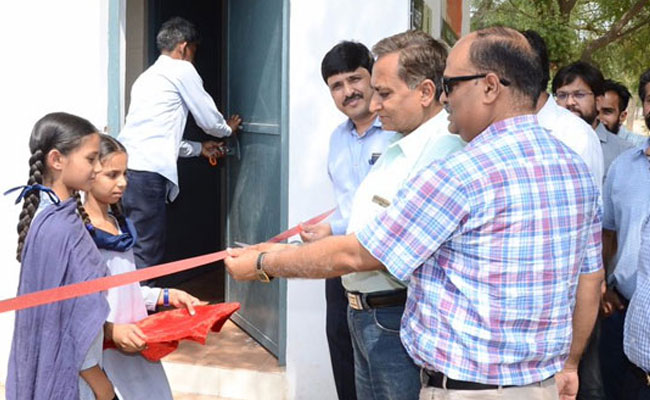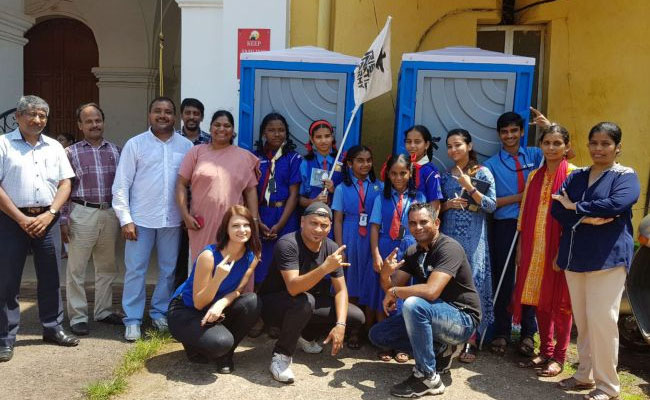New Delhi: Six years before the launch of Swachh Bharat Abhiyan, Sikkim became India’s first open defecation state, securing the status in 2008. Today, in West Sikkim’s Lingchom Government Secondary school, rows of clean, separate toilets for girls and boys ensure an environment of safe sanitation and hygiene. But till 2015, students of Lingchom, like many schools across India, had to put up with unsafe sanitation conditions, despite the state being an ODF one. Common toilets for boys and girls, many of which were unclean, often resulted in students dropping out, a common phenomenon across schools in India. While building household and community/public toilets is a priority for the Swachh Bharat Abhiyan, sanitation in schools has also been identified as an area to be worked upon. Since the launch of the mission in October 2014, over one million schools now have separate toilets for boys and girls, up from six lakhs when the mission was launched.
Water, sanitation and hygiene (WASH) facilities in Indian schools were woefully poor till the mid-2000s. The objective of the WASH programme is to ensure that students have access to clean and functional toilets and wash their hands before and after using a toilet. The launch of the Nirmal Bharat Abhiyan in 2009 and Swachh Bharat Abhiyan in 2014 has improved the sanitation scenario in schools by 2015-16, all primary and secondary schools in India had toilet coverage of 97.02 per cent for boys and 97.52 per cent for girls. Improved WASH facilities in schools not only ensure a healthy learning atmosphere for students, but also sensitises them towards hygiene and safe sanitation practices.
Both the presence and lack of WASH facilities in schools impact sanitation related behaviour among children. Lack of proper WASH facilities encourages them to adopt unsafe sanitation practices like open defecation and not washing of hands. On the other hand, if they are able to inculcate safe sanitation practices right from the time they attend school, not only do they grow up with such values but also often end up convincing their household members to follow safe sanitation practices, said Sushmita Sengupta, sanitation expert at Centre for Science and Environment.
In schools across urban and rural India, teachers, teaching coordinators are looking to involve students in WASH programmes. Here are five steps to follow for schools which are looking to create a successful WASH programmes and inculcate behavioural change among current and future citizens.
1. Ensure Availability Of Gender Segregated Toilets
First and foremost, separate, well-maintained toilets for boys and girls are a must in every school. Such toilets must be built, with continuous water supply so that they are clean after use and does not deter anyone from using them again. Schools are social gathering points for children and play a crucial role in their shaping up as individuals. Availability of well-maintained toilets gives students the assurance that they need to step outside to access sanitation facilities. For female students, availability of toilets is a deciding factor in continuing with school education, especially when their menstrual cycle sets in. It should be up to school teachers and authorities to regularly check the status of toilets in a school.
“Toilets are often treated as secondary subjects in schools. A WASH culture can only develop when students find toilets usable and clean. Similar to curriculum design, the subject of sanitation should also be prioritised by schools,” said Arundati Muralidaran, Manager Policy, WASH in Schools, WaterAid India.
2. Make WASH A Part Of School Curriculum
Awareness on sanitation and hygiene is beneficial not only during one’s school life, but also in later stages of life. Children tend to retain and practice what they are taught when young and sensitisation about WASH is no exception. In Madhya Pradesh, several primary and secondary schools have begun including chapters on sanitation, hand washing and water usage as part of the school syllabus. The chapters give students basic lessons on using toilets, washing hands and using water adequately after toilet usage. Such basic lessons can help students understand the importance of WASH and aid safe sanitation habits being ingrained in them for life.
3. Encourage Students To Take Up WASH Activities In Local Communities
Teachers and coordinators imparting WASH lessons must encourage students not to restrict whatever is learned within the four walls of the schools. Tips on usage of toilets and hand washing are beneficial to all, irrespective of their age. Students must be encouraged to go back to their homes and their local communities, and engage in dialogue on safe sanitation practices. In households which do not have toilets, students can push their parents to build one, thus ensuring the spread of the benefits of safe sanitation practices among the community. In Rajasthan’s Alwar, students from Jatpur school eradicated open defecation from their school by building toilets from money collected during marriage ceremonies.
4. Engage Children In Interactive Activities Related To WASH
WASH is an essential lesson which instills behavioural change in students. Instead of monotonous lectures on sanitation and hygiene, teachers should look at engaging students in interactive activities which will allow them to understand the practical implications of safe sanitation instead of treating it as merely an academic subject. Storytelling sessions, plays, songs, quiz contests designed on WASH can arouse the interest of students and ensure that they learn about sanitation in a structured manner. Teachers should also hold discussions with students and encourage them to provide ideas related to WASH and steps that can be taken to resolve problems like unwillingness to build and use toilets.
5. Provide Lessons In Basic Waste Management
Concepts of segregation and recycling are still struggling to catch on India, as many are finding it difficult to let go of the habit of throwing garbage indiscriminately. If young students are taught in detail about waste management, segregation and how to deal with waste at source of generation, they can carry forward the message back to their homes and communities. The 3Rs of waste management – reduce, reuse and recycle, if practised by school students today, can shape a cleaner tomorrow for India.
NDTV – Dettol Banega Swachh India campaign lends support to the Government of India’s Swachh Bharat Mission (SBM). Helmed by Campaign Ambassador Amitabh Bachchan, the campaign aims to spread awareness about hygiene and sanitation, the importance of building toilets and making India open defecation free (ODF) by October 2019, a target set by Prime Minister Narendra Modi, when he launched Swachh Bharat Abhiyan in 2014. Over the years, the campaign has widened its scope to cover issues like air pollution, waste management, plastic ban, manual scavenging and menstrual hygiene. The campaign has also focused extensively on marine pollution, clean Ganga Project and rejuvenation of Yamuna, two of India’s major river bodies.

























